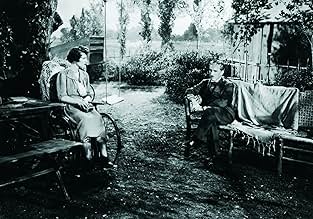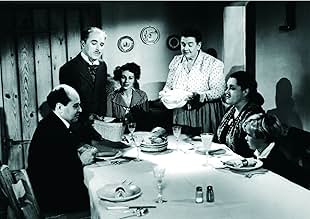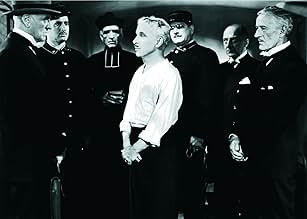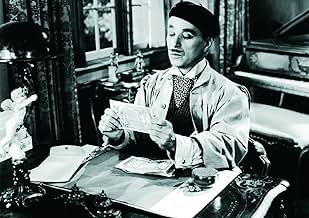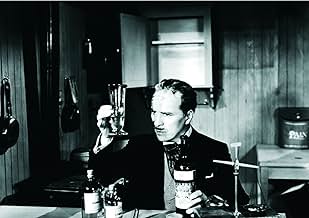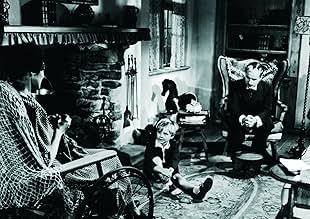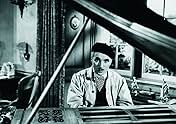Monsieur Verdoux
- 1947
- Tous publics
- 2h 4m
IMDb RATING
7.8/10
20K
YOUR RATING
A suave but cynical man supports his family by marrying and murdering rich women for their money, but the job has some occupational hazards.A suave but cynical man supports his family by marrying and murdering rich women for their money, but the job has some occupational hazards.A suave but cynical man supports his family by marrying and murdering rich women for their money, but the job has some occupational hazards.
- Director
- Writers
- Stars
- Nominated for 1 Oscar
- 6 wins & 1 nomination total
Ada May
- Annette - Her Maid
- (as Ada-May)
Bernard Nedell
- Prefect of Police
- (as Bernard J. Nedell)
- Director
- Writers
- All cast & crew
- Production, box office & more at IMDbPro
Featured reviews
A satire on a serial killer is not your everyday movie fare. I can see why audiences of that day were turned off by the Little Tramp's sudden homicidal turn. Of course, it's all treated with a light comedic hand until the moralizing end. Still, Chaplin's subtext comes through clearly at certain points-, such that unemployment can drive men to extremes when they've got a family to support.
On the other hand, not every man, of course, turns to fleecing rich widows and then dispatching them in cold-blooded fashion. But that brings him to his second point--- namely "numbers sanctify". Kill one person and you're a murderer; kill a thousand and you're a hero. Here it appears he's referring to the state that historically kills by the thousands in the name of the patriotism. Remember, the movie's coming right after the close of the horrific WWII, and he finds the point ironic.
But Verdoux's not through. Capitalism is indirectly indicted for its periodic booms and busts that lead to joblessness, and millions upon millions for munitions manufacturers who prosper during wartime. As for the consolations of religion that come at the end, the gentleman killer appears indifferent without being insulting. Since Chaplin's the sole screenwriter, it's no stretch to believe he's speaking for himself on these matters. Given this rather wholesale indictment of many of the West's leading institutions, small wonder he left the country shortly after under a cloud of controversy.
Nonetheless, the movie hits its comedic highpoints with Martha Raye as the loudly vulgar Annabella. Try as he does to do her in, she manages to comically thwart him at every turn. That scene in the fishing boat's a classic. All his polished charm and oily flattery just slide by her obnoxious silliness. Raye makes a perfect foil and an inspired piece of casting.
Of course, some of the beguiling Little Tramp remains in Verdoux's character, as when he befriends the penniless girl (Nash), or in that supremely ironic moment when he ambles Tramp-style toward the guillotine. All in all, it's a strange little movie that was apparently shelved for years for obvious reasons. Nonetheless, it was rather gutsy for Chaplin to take such chances with his established character and at Cold War's outset. It's fairly humorous until you think about its serious points, which are still worth pondering.
On the other hand, not every man, of course, turns to fleecing rich widows and then dispatching them in cold-blooded fashion. But that brings him to his second point--- namely "numbers sanctify". Kill one person and you're a murderer; kill a thousand and you're a hero. Here it appears he's referring to the state that historically kills by the thousands in the name of the patriotism. Remember, the movie's coming right after the close of the horrific WWII, and he finds the point ironic.
But Verdoux's not through. Capitalism is indirectly indicted for its periodic booms and busts that lead to joblessness, and millions upon millions for munitions manufacturers who prosper during wartime. As for the consolations of religion that come at the end, the gentleman killer appears indifferent without being insulting. Since Chaplin's the sole screenwriter, it's no stretch to believe he's speaking for himself on these matters. Given this rather wholesale indictment of many of the West's leading institutions, small wonder he left the country shortly after under a cloud of controversy.
Nonetheless, the movie hits its comedic highpoints with Martha Raye as the loudly vulgar Annabella. Try as he does to do her in, she manages to comically thwart him at every turn. That scene in the fishing boat's a classic. All his polished charm and oily flattery just slide by her obnoxious silliness. Raye makes a perfect foil and an inspired piece of casting.
Of course, some of the beguiling Little Tramp remains in Verdoux's character, as when he befriends the penniless girl (Nash), or in that supremely ironic moment when he ambles Tramp-style toward the guillotine. All in all, it's a strange little movie that was apparently shelved for years for obvious reasons. Nonetheless, it was rather gutsy for Chaplin to take such chances with his established character and at Cold War's outset. It's fairly humorous until you think about its serious points, which are still worth pondering.
In his autobiography Charles Chaplin called this film his "cleverest and most brilliant" comedy, yet very few people at the time the movie was released shared this view. It was the first Chaplin US failure both with critics and audiences (though in Europe the film did quite well).
Here Chaplin plays Henri Verdoux, a serial killer who makes his living by marrying and murdering lonely reach women. Chaplin softened his character by making him a lifelong bank clerk who was laid off at the age when it was already too late to start life anew, meanwhile he has a family to support (a small son and an invalid wife). He's caught and put to trial where he accuses a hypocritical society of sanctioned mass murders and describes himself as an amateur in the field. Originally the idea belonged to Orson Welles who wanted to make a movie based on the story of a notorious murderer Henri Landru, a Frenchman who was executed in 1922 for murdering 8 women. Welles asked Chaplin to star in his film but the latter refused as he thought it was too late for him to play in a movie directed by someone else. But he bought the original idea from Welles and made what could have been a detective story or a thriller into a black comedy. It was certainly provocative and its sarcastic and ironic gravity was astonishing for the time. There is a scene, for instance, when Verdoux while waiting for the execution, talks to a journalist and pronounces the words that still fill me with horror (as they are as true nowadays as they had been fifty years ago):"Wars, conflicts - it's all business. One murder makes a villain; millions a hero. Numbers sanctify." Yet "Monsieur Verdoux" which is generally known as the most pessimistic of Chaplin films is not devoided of humour. On the contrary, at some moments it's extraordinary funny: take for instance the famous scenes with his "wives" (Annabella or Lydia)or those with madam Grosnay (my favourite bit is when Verdoux is talking to her from a flower shop, the look at the flower girl's face is wonderful!). I believe the film is one of the best I've ever seen and I highly recommend it to everyone.
Here Chaplin plays Henri Verdoux, a serial killer who makes his living by marrying and murdering lonely reach women. Chaplin softened his character by making him a lifelong bank clerk who was laid off at the age when it was already too late to start life anew, meanwhile he has a family to support (a small son and an invalid wife). He's caught and put to trial where he accuses a hypocritical society of sanctioned mass murders and describes himself as an amateur in the field. Originally the idea belonged to Orson Welles who wanted to make a movie based on the story of a notorious murderer Henri Landru, a Frenchman who was executed in 1922 for murdering 8 women. Welles asked Chaplin to star in his film but the latter refused as he thought it was too late for him to play in a movie directed by someone else. But he bought the original idea from Welles and made what could have been a detective story or a thriller into a black comedy. It was certainly provocative and its sarcastic and ironic gravity was astonishing for the time. There is a scene, for instance, when Verdoux while waiting for the execution, talks to a journalist and pronounces the words that still fill me with horror (as they are as true nowadays as they had been fifty years ago):"Wars, conflicts - it's all business. One murder makes a villain; millions a hero. Numbers sanctify." Yet "Monsieur Verdoux" which is generally known as the most pessimistic of Chaplin films is not devoided of humour. On the contrary, at some moments it's extraordinary funny: take for instance the famous scenes with his "wives" (Annabella or Lydia)or those with madam Grosnay (my favourite bit is when Verdoux is talking to her from a flower shop, the look at the flower girl's face is wonderful!). I believe the film is one of the best I've ever seen and I highly recommend it to everyone.
It would be hard to imagine anyone else playing Monsieur Verdoux; Charlie Chaplin was the only one who could pull it off in any form or style or way that wouldn't make the character as just an unlikeable killer of women. As it's written on the page the character, if played by someone with less charisma or charm or comic timing, would just be another character actor playing a villain. But Chaplin taking the part is inspired on his part, and it's a good thing too (and I never thought I'd say this) that he didn't let Orson Welles direct. With Welles it obviously would have been a visually awesome picture, but would the comedy be the same? Or the emphasis on the social message blending in with the ultimate sanctimonious attitude of the character? It would be interesting to see Welles script, if it exists, but as it stands he's mostly a footnote in his tale, if a thankful one.
Under Chaplin's direction and writing Monsieur Verdoux is timed with finesse and glee and with a repetitive transition of the train going by quickly with Chaplin's piano key strokes, and it's often devilish fun to hear how Chaplin's Verdoux gets around and about (or sometimes not) killing and robbing his victims. And yet, I'm inclined to say that it's above all else a triumph for Chaplin as an actor, a performer who's iconic appeal, even past the Tramp character, makes us (or at least me) almost cheer him on or feel awkward or cringing during a scene leading up to a murder, or, as does happen once or twice, not. He knows how to put on an air that's genuine, even as it's the most blatant con, and he does it with a gentleman's manner hiding his desperate-times-call-for-desperate-measures ex-bank clerk. While I wouldn't go as far as James Agee in calling it the greatest male performance ever, it might just be my favorite Chaplin performance, full of ranging subtleties and over-the-top expressions and just lingering looks of contempt and malaise and sorrow and outright lying and etc that are just a knockout.
Monsier Verdoux is a peculiar character, as his crimes are meant to be for the good of his wife and child who, of course, have no idea of what he's really doing (in an acidic touch, his wife is also crippled). Is it wrong what he's doing? In the legal sense, of course. But Chaplin sets up a moral code for this character that makes things trickier, a little warped in thinking. If the woman has lots of wealth stored away- and maybe, as with the one who keeps getting away via wine glass and fishing trip, almost deserving in the perception of the character- why carp? But then there's the woman who's just out of prison, her husband's gone, nothing to her name, and... he just can't bear to do her in (especially, as should be noted, as a "test" run for another victim). It becomes curious to see her later on, sort of as the not-quite Chaplin heroine of the story, and how saving the right one for Verdoux is what counts, despite forgetting her until she reappears.
So there's this twisted logic, but in the set-pieces that Chaplin sets up are some of the finest, most brilliantly timed comic moments of his career, filmed for a dark suspense tinged with a near sweetness that we know and love from him. It's satire on a level that is no more or less sophisticated than Chaplin's major silent works, and yet it's just a little sharper, more pointed at the ills of man in turmoil than a simple psychopath, all in the realm of delightful crimes in the upper class. While the end may seem derivative of the Great Dictator with a speech and message chocked forward like spray-paint on a wall, it's a mixed reaction one might have; the sanctimonious attitude, of being accepting and pointing the finger back on society, is haunting and obvious and also, importantly, speaks to the nature of the character. Would a man somewhat comfortable in his own mortality face the end any other way?
Under Chaplin's direction and writing Monsieur Verdoux is timed with finesse and glee and with a repetitive transition of the train going by quickly with Chaplin's piano key strokes, and it's often devilish fun to hear how Chaplin's Verdoux gets around and about (or sometimes not) killing and robbing his victims. And yet, I'm inclined to say that it's above all else a triumph for Chaplin as an actor, a performer who's iconic appeal, even past the Tramp character, makes us (or at least me) almost cheer him on or feel awkward or cringing during a scene leading up to a murder, or, as does happen once or twice, not. He knows how to put on an air that's genuine, even as it's the most blatant con, and he does it with a gentleman's manner hiding his desperate-times-call-for-desperate-measures ex-bank clerk. While I wouldn't go as far as James Agee in calling it the greatest male performance ever, it might just be my favorite Chaplin performance, full of ranging subtleties and over-the-top expressions and just lingering looks of contempt and malaise and sorrow and outright lying and etc that are just a knockout.
Monsier Verdoux is a peculiar character, as his crimes are meant to be for the good of his wife and child who, of course, have no idea of what he's really doing (in an acidic touch, his wife is also crippled). Is it wrong what he's doing? In the legal sense, of course. But Chaplin sets up a moral code for this character that makes things trickier, a little warped in thinking. If the woman has lots of wealth stored away- and maybe, as with the one who keeps getting away via wine glass and fishing trip, almost deserving in the perception of the character- why carp? But then there's the woman who's just out of prison, her husband's gone, nothing to her name, and... he just can't bear to do her in (especially, as should be noted, as a "test" run for another victim). It becomes curious to see her later on, sort of as the not-quite Chaplin heroine of the story, and how saving the right one for Verdoux is what counts, despite forgetting her until she reappears.
So there's this twisted logic, but in the set-pieces that Chaplin sets up are some of the finest, most brilliantly timed comic moments of his career, filmed for a dark suspense tinged with a near sweetness that we know and love from him. It's satire on a level that is no more or less sophisticated than Chaplin's major silent works, and yet it's just a little sharper, more pointed at the ills of man in turmoil than a simple psychopath, all in the realm of delightful crimes in the upper class. While the end may seem derivative of the Great Dictator with a speech and message chocked forward like spray-paint on a wall, it's a mixed reaction one might have; the sanctimonious attitude, of being accepting and pointing the finger back on society, is haunting and obvious and also, importantly, speaks to the nature of the character. Would a man somewhat comfortable in his own mortality face the end any other way?
Charlie Chaplin is "Monsieur Verdoux" in this 1947 film based on the real-life serial killer Henri Landru. Verdoux is a bank clerk who is laid off late in life and turns to marrying and killing women for their money in order to support his invalid wife and child. Sounds brutal, and when you think about it, it really is, but Chaplin as usual manages to couch his message in comedy. While we see that he is successful in knocking off a couple of women and getting their money (though we never actually see a murder), Verdoux has a couple of failures as well, and there the fun begins. One of his women, Annabella Bonheur, is played hysterically by Martha Raye as a vulgar loudmouth eternally suspicious of Verdoux, who is posing as a boat captain. He tries some different ways of killing her, but no matter what he does, nothing works. He then turns his attention to another woman he's been chasing for some time, Marie Grosnay (Isobel Elsom). He's about to walk down the aisle when who does he see as a guest at the wedding - Annabelle. His attempts to get out of the house are priceless.
Despite some genuinely comical scenes, the speech that Verdoux makes gives its deeper message - Verdoux was in it for the money. To him, the women were business propositions to be exploited. His point is that what he has done on a smaller scale is being done by dictators worldwide; people are not treated as human beings but merely for economic gain, for power and for exploitation. Though Verdoux's argument doesn't absolve him of responsibility or justify his actions, the warning is a good one - people need to care more about each other and about what's going on in their world, and put their attention on really important matters like suppression of the masses. Why, he asks, are the headlines full of Verdoux and not of what is going on around the world? (The film's ending takes place in 1937.) It's interesting to consider what would have happened to this story in the hands of Orson Welles, whose idea it was originally. He wouldn't have made it a comedy. It would have been a drama or a detective story. Only Chaplin would think of making the story of a serial killer into a comedy of sorts. Certainly 1967's "No Way to Treat a Lady" takes a page or so from this script.
"Monsieur Verdoux" wasn't well received by the public - at all - and by 1947, people were questioning Chaplin's politics instead of reveling in his genius. It possibly was ahead of its time; it certainly wasn't appreciated as it is today. The movie is not without some problems, the biggest one being, what the heck happened to Verdoux's wife and child? It is never explained.
"Wars, conflicts - it's all business. One murder makes a villain; millions a hero. Numbers sanctify." Charlie Chaplin as Verdoux said that 61 years ago.
Despite some genuinely comical scenes, the speech that Verdoux makes gives its deeper message - Verdoux was in it for the money. To him, the women were business propositions to be exploited. His point is that what he has done on a smaller scale is being done by dictators worldwide; people are not treated as human beings but merely for economic gain, for power and for exploitation. Though Verdoux's argument doesn't absolve him of responsibility or justify his actions, the warning is a good one - people need to care more about each other and about what's going on in their world, and put their attention on really important matters like suppression of the masses. Why, he asks, are the headlines full of Verdoux and not of what is going on around the world? (The film's ending takes place in 1937.) It's interesting to consider what would have happened to this story in the hands of Orson Welles, whose idea it was originally. He wouldn't have made it a comedy. It would have been a drama or a detective story. Only Chaplin would think of making the story of a serial killer into a comedy of sorts. Certainly 1967's "No Way to Treat a Lady" takes a page or so from this script.
"Monsieur Verdoux" wasn't well received by the public - at all - and by 1947, people were questioning Chaplin's politics instead of reveling in his genius. It possibly was ahead of its time; it certainly wasn't appreciated as it is today. The movie is not without some problems, the biggest one being, what the heck happened to Verdoux's wife and child? It is never explained.
"Wars, conflicts - it's all business. One murder makes a villain; millions a hero. Numbers sanctify." Charlie Chaplin as Verdoux said that 61 years ago.
This movie is a fine example of a genre which attained enormous popularity during and in the decade after World War Two. These so-called "black comedies" (a term perhaps alluding to the funereal subject matter, ranging from fluffy (Noel Coward's "Bithe Spirit" - on stage in 1941, filmed in 1945) to darkly absurd (Ealing's "The Ladykillers" in 1955), turned death into situation comedy. Falling out of favour in the 60s, black comedy returned somewhat in the work of Robert Altman, before being brought back to full glory by the Coen Brothers.
Although the most enduringly successful example of black comedy is perhaps "Arsenic and Old Lace" (stage 1941/film 1944), two of the very greatest filmmakers blessed it with their contributions. Alfred Hitchcock to some extent incarnated the essence of it every time he introduced an episode of "Alfred Hitchcock Presents", but his definitive statement - "The Trouble with Harry" - just preceded the TV shows in 1955.
Charles Chaplin's dark vision, "Monsieur Verdoux", was released in 1947, just before the anti-Communist cries against him were to drive him out of America. A political backdrop is either entirely absent or implicit in the other examples of the genre I've mentioned, but Chaplin makes it explicit, and some might say that, to some extent, this unbalances the last reel of an otherwise utterly brilliant film. Others perhaps will be more sympathetic to the historical context. For me, while completely supporting Chaplin's observations concerning the business of war, the heavy underlining of his message does seem a flaw when viewing the film today.
All the same, "Monsieur Verdoux" is a magnificent achievement, not least in its wonderful gallery of characters, many played by character actors rarely seen on screen. Two in particular stand out, both playing wives of the much-married Verdoux: dour, unsmiling Margaret Hoffman, who goes to her death in an extraordinary scene of darkness followed by sudden light; and Martha Raye, in her best cinematic role, as the wife Verdoux fails to kill. Raye is such an explosion of energy and personality that the screen can barely contain her. To watch her and Chaplin in their scenes together is sheer joy.
The script is witty, the photography excellent, and Chaplin's penchant for sentimentality is held well in check. It is, except for the end, an unusually subtle movie, its tone completely in keeping with its French setting.
Although the most enduringly successful example of black comedy is perhaps "Arsenic and Old Lace" (stage 1941/film 1944), two of the very greatest filmmakers blessed it with their contributions. Alfred Hitchcock to some extent incarnated the essence of it every time he introduced an episode of "Alfred Hitchcock Presents", but his definitive statement - "The Trouble with Harry" - just preceded the TV shows in 1955.
Charles Chaplin's dark vision, "Monsieur Verdoux", was released in 1947, just before the anti-Communist cries against him were to drive him out of America. A political backdrop is either entirely absent or implicit in the other examples of the genre I've mentioned, but Chaplin makes it explicit, and some might say that, to some extent, this unbalances the last reel of an otherwise utterly brilliant film. Others perhaps will be more sympathetic to the historical context. For me, while completely supporting Chaplin's observations concerning the business of war, the heavy underlining of his message does seem a flaw when viewing the film today.
All the same, "Monsieur Verdoux" is a magnificent achievement, not least in its wonderful gallery of characters, many played by character actors rarely seen on screen. Two in particular stand out, both playing wives of the much-married Verdoux: dour, unsmiling Margaret Hoffman, who goes to her death in an extraordinary scene of darkness followed by sudden light; and Martha Raye, in her best cinematic role, as the wife Verdoux fails to kill. Raye is such an explosion of energy and personality that the screen can barely contain her. To watch her and Chaplin in their scenes together is sheer joy.
The script is witty, the photography excellent, and Chaplin's penchant for sentimentality is held well in check. It is, except for the end, an unusually subtle movie, its tone completely in keeping with its French setting.
Did you know
- TriviaVerdoux's quote "One murder makes a villain; millions a hero" is taken from the abolitionist Bishop Beilby Porteus (1731-1808).
- GoofsWhen Monsieur Verdoux states the area of the house being sold he mentions the lengths in feet. As the film is set in France, he should have used meters.
- Quotes
Henri Verdoux: Wars, conflict - it's all business. One murder makes a villain; millions, a hero. Numbers sanctify, my good fellow!
- Alternate versionsThe West German theatrical version was cut by approximately 15 minutes.
- ConnectionsFeatured in L'Amour extra large (2001)
- How long is Monsieur Verdoux?Powered by Alexa
Details
- Release date
- Country of origin
- Official sites
- Languages
- Also known as
- A Comedy of Murders
- Filming locations
- Production company
- See more company credits at IMDbPro
Box office
- Budget
- $2,000,000 (estimated)
- Gross US & Canada
- $64,636
- Gross worldwide
- $65,718
- Runtime2 hours 4 minutes
- Color
- Aspect ratio
- 1.37 : 1
Contribute to this page
Suggest an edit or add missing content



